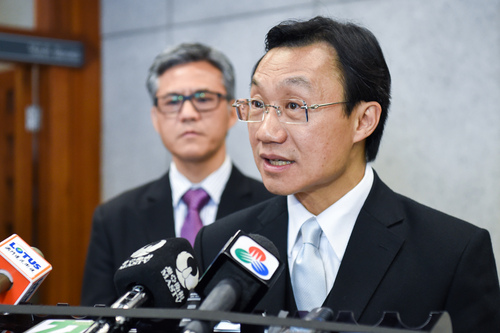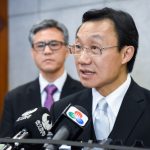 Secretary for Social Affairs and Culture, Mr Tam Chon Weng, speaks to reporters.
Secretary for Social Affairs and Culture, Mr Tam Chon Weng, speaks to reporters.
The Government would make more efforts to attract higher education students from countries and regions covered in the “Belt and Road” initiative, in a bid to turn Macao into an education hub and a platform of cultural exchanges. The Secretary for Social Affairs and Culture, Mr Tam Chon Weng, made the comments on Monday (18 January) after a swearing-in ceremony for respectively, the two Vice Presidents of the Social Welfare Bureau, Mr Hon Wai and Mr Au Chi Keung; and for departmental chiefs of the Bureau. Mr Tam told reporters that Macao could play a more important role in the country’s development of the Silk Road Economic Belt and the 21st Century Maritime Silk Road (known as the “Belt and Road” initiative), especially in fields such as science and technology, education, culture, tourism and commerce. The Government is to consider launching policies to make it easier for higher education students from Portuguese-speaking countries to study subjects such as tourism and Mandarin language in Macao. That in turn would help strengthen Macao’s bridging role as a commerce and trade cooperation service platform between China and the Portuguese-speaking countries. The Government is also to consider increasing the quota for mainland students attending higher education programmes in Macao. Currently, the University of Macau offers scholarships at postgraduate level to mainland students, the Secretary said. The major task required in order to transform Macao into a platform for education was to make further use of the facilities in the city’s higher education institutions. This would create a better educational environment, Mr Tam said. The initial proposal for such a policy on education was suggested by Macao to the mainland’s Ministry of Education. The idea also involved expanding the present educational cooperation network between Macao and institutions on the mainland, he said.


